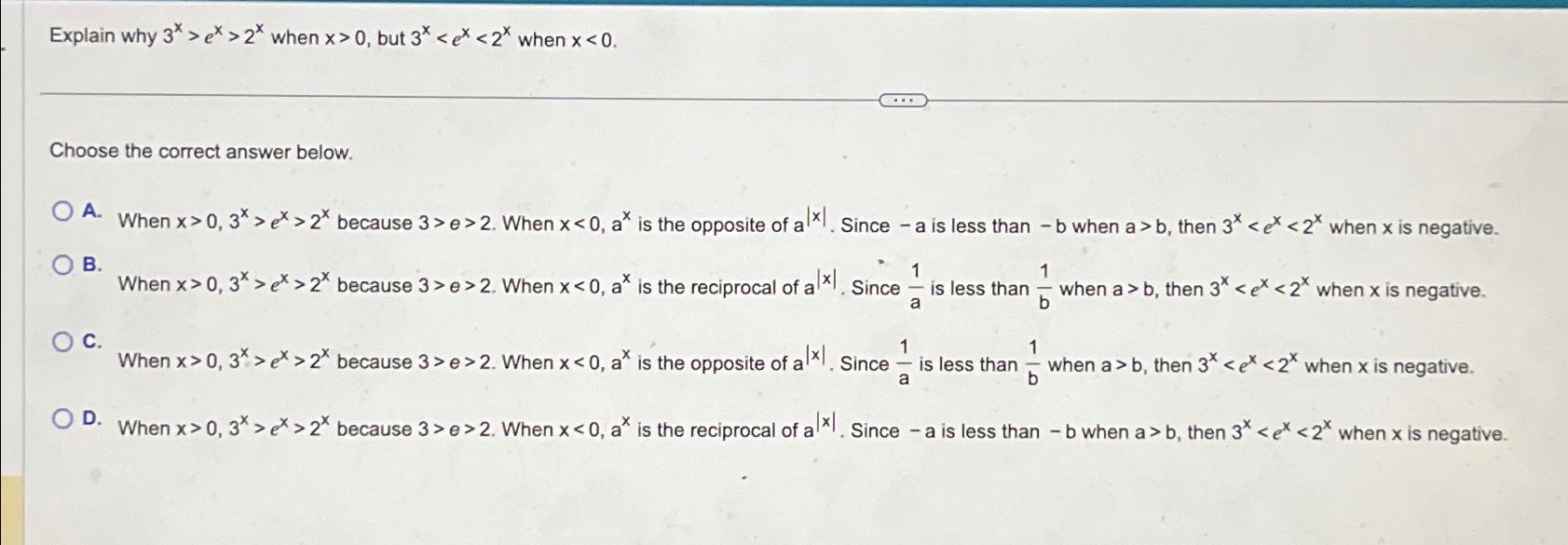Answered step by step
Verified Expert Solution
Question
1 Approved Answer
Explain why 3^(x)>e^(x)>2^(x) when x>0 , but x0,3^(x)>e^(x)>2^(x)3>e>2xbxx>0,3^(x)>e^(x)>2^(x)3>e>2xbxx>0,3^(x)>e^(x)>2^(x)3>e>2xbxx>0,3^(x)>e^(x)>2^(x)3>e>2xbx3^(x) when x is negative3^(x) when x is negative. D. When x>0,3^(x)>e^(x)>2^(x) because 3>e>2. When xb, then 3^(x)
Explain why
3^(x)>e^(x)>2^(x)when
x>0, but
x0,3^(x)>e^(x)>2^(x)3>e>2xbxx>0,3^(x)>e^(x)>2^(x)3>e>2xbxx>0,3^(x)>e^(x)>2^(x)3>e>2xbxx>0,3^(x)>e^(x)>2^(x)3>e>2xbx3^(x) when x is negative3^(x) when x is negative.\ D. When x>0,3^(x)>e^(x)>2^(x) because 3>e>2. When xb, then 3^(x) when x is negative3^(x) when x is negative.\ C. When x>0,3^(x)>e^(x)>2^(x) because 3>e>2. When xb, then 3^(x) when x is negative.\ D. When x>0,3^(x)>e^(x)>2^(x) because 3>e>2. When xb, then 3^(x) when x is negative3^(x) when x is negative.\ B. When x>0,3^(x)>e^(x)>2^(x) because 3>e>2. When xb, then 3^(x) when x is negative.\ C. When x>0,3^(x)>e^(x)>2^(x) because 3>e>2. When xb, then 3^(x) when x is negative.\ D. When x>0,3^(x)>e^(x)>2^(x) because 3>e>2. When xb, then 3^(x) when x is negative3^(x) when x0,3^(x)>e^(x)>2^(x) because 3>e>2. When xb, then 3^(x) when x is negative.\ B. When x>0,3^(x)>e^(x)>2^(x) because 3>e>2. When xb, then 3^(x) when x is negative.\ C. When x>0,3^(x)>e^(x)>2^(x) because 3>e>2. When xb, then 3^(x) when x is negative.\ D. When x>0,3^(x)>e^(x)>2^(x) because 3>e>2. When xb, then 3^(x) when x is negative 
Step by Step Solution
There are 3 Steps involved in it
Step: 1

Get Instant Access to Expert-Tailored Solutions
See step-by-step solutions with expert insights and AI powered tools for academic success
Step: 2

Step: 3

Ace Your Homework with AI
Get the answers you need in no time with our AI-driven, step-by-step assistance
Get Started


